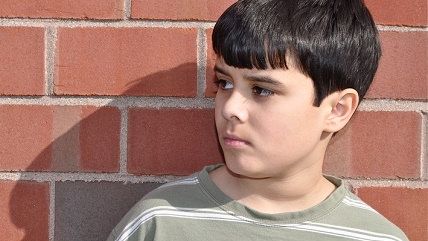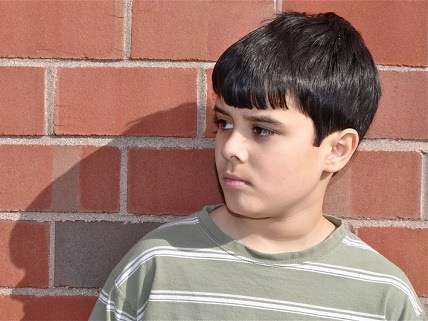Learning-Disabled 12-Year-Old Arrested, Locked Up for Inappropriate Touching
Schools should call the cops as a matter of last resort, not as a default response to misbehavior.


A 12-year-old boy from Porter, Texas, spent a night in juvenile detention after cops arrested him for inappropriately touching another student, a girl, at school. He might face criminal charges of indecency with a child.
The boy has a learning disability and struggles to communicate with other classmates, according to his father, Fred Lillie. On Wednesday, the boy approached a group of girls on the playground and ended up touching one of them, ABC13 reports:
The 12-year-old, who has trouble socializing with his peers, is accused of approaching a group of girls on the playground and touching one of them below the belt in the front of her pants.
It set off a chain of events that saw the boy fingerprinted at school, then put behind bars in juvenile detention overnight.
Lillie said, "It's sad because it shouldn't have happened. I mean, I know my son, my son had no intent that way."
According to the boy's parents, the child has a written Behavior Intervention Plan that was not followed by the school. The parents contend the plan requires the boy have adult supervision which did not happen Wednesday.
The boy is facing charges of indecency with a child. The family's lawyer says the offending touch may have been inappropriate but it was not a criminal offense.
This news story is a little vague regarding the inappropriate touching. Was it inadvertent? Was it a deliberate act from a child who doesn't understand the consequences of his actions? Or was it a deliberate act from a child who does understand consequences and really should have known better?
The answer to this question should have informed the school's response. But in almost any case, a night in juvenile detention is an extreme punishment, especially for a 12-year-old who doesn't seem to be an active threat to anyone. Nevertheless, the school defended its decision to call the cops in a statement to the press:
"Student safety is a top priority for New Caney ISD. The district cannot comment on student disciplinary issues due to legal restraints. When a criminal act allegedly occurs on campus, incidents are referred to the Montgomery County District Attorney's office. How the district attorney's office decides to proceed with the case can impact what disciplinary actions are taken by the school district following an incident."
This statement implies that hysterical overreaction to student misbehavior is official policy at the school. Administrators make no effort to separate actually dangerous conduct from conduct that is inappropriate and unwelcome but far from threatening—no, they just call the cops regardless.
I don't mean to suggest that a kid touching another kid inappropriately is some trivial matter; the girl has every right not to be touched, and that right was violated. I also don't mean to suggest a learning disability gives a kid a free pass to misbehave. All disabilities are not alike, and it isn't clear from the news story how socially impaired he actually is.
But when the perpetrators and victims of these kinds of infractions are children, is not some restraint expected? Doesn't the school have an obligation to teach this kid why his actions were wrong, comfort the girl if she is upset, and impose a reasonable punitive measure?
The alternative—treating kids, even disabled kids, as fully-formed adults who will face the maximum possible punishment for any and every infraction—requires children to already be perfect. It's just not realistic.
If the kid does something very bad, or routinely causes trouble, there might be grounds for removing him from the school. But I still wouldn't want to see him locked up, unless that was really the only way to keep the world safe from his actions. And charging him with indecency with a child—an insane idea, given that he is himself a child—is a cruel way to make what is sure to be a difficult life (depending on how serious the disability is) much, much more difficult.
This story calls to mind the boy who faces assault charges for kissing a girl without her permission. In both of these cases, the aggressor's actions were wrong. But kids make a lot of mistakes, and if schools aren't prepared to respond appropriately—to repair the mistakes without breaking the children—what use are they?
Calling the cops on a child is an extreme solution that will irrevocably change that youngster's life forever. It shouldn't be the default plan of action every time a kid acts out.


Show Comments (51)